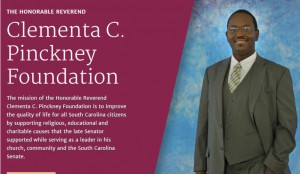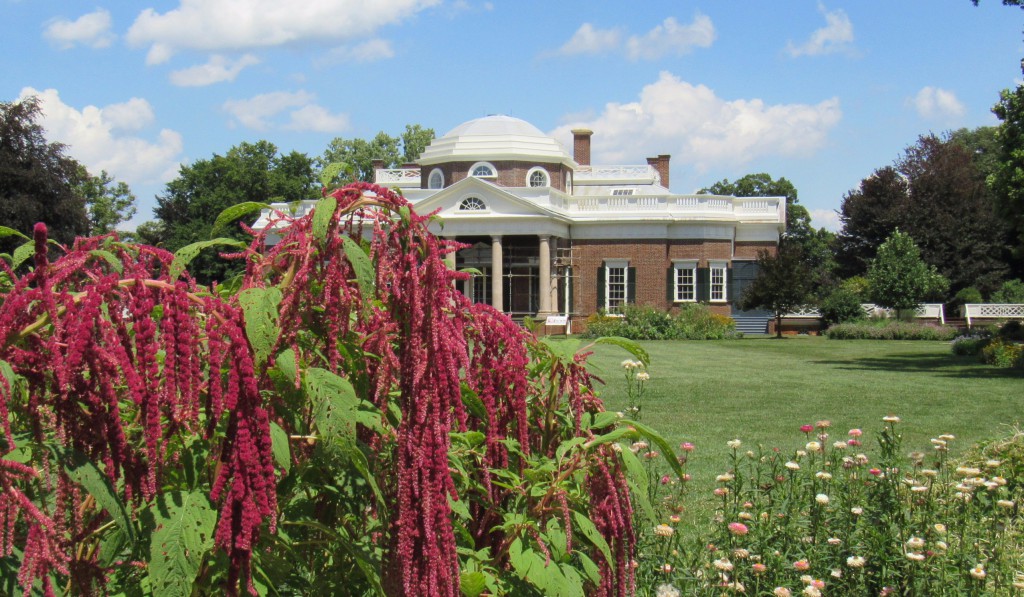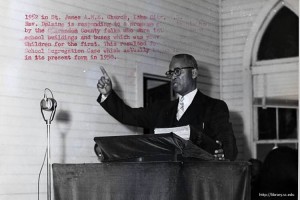In the foreground is a drooping red flowering plant that sounds absolutely Shakespearean — “Love Lies Bleeding.” And that sounds just right, as the plant was spied at a place dedicated to lots of different plants by a Founding Father horticulturist — Thomas Jefferson. His home, Monticello, is in the background. Photo by Andy Brack.
IN THIS ISSUE
PHOTO: Love Lies Bleeding at Monticello
TODAY’S FOCUS: Pinckney family starts foundation
BRACK: Time to deal with elephant in state’s room
IN THE SPOTLIGHT: LaFond Law
PALMETTO POEM: In Season, by Katrina Murphy
GOOD NEWS: Streaming media from library
FEEDBACK: On carriage horses and heat
CALENDAR: Tax-free school weekend, more
REVIEW: Murder of Magpies
MYSTERY: What is this cool flower?
S.C. ENCYCLOPEDIA: The Rev. Joseph A. DeLaine
TODAY’S FOCUS
Pinckney family starts charitable foundation
AUG. 3, 2015 | The family of the late state Sen. Clementa Pinckney, one of the victims of the Charleston church shooting on June 17, last week established a charitable foundation to continue his work on what would have been his 42nd birthday.
 “While the shock has started to dissipate, we are still in a state of deep grief,” said Jennifer Pinckney, the late senator’s wife and new chair of the Honorable Reverend Clementa C. Pinckney Foundation. “But, we are answering God’s call to continue my husband’s work and that starts with establishing a charitable foundation in his honor.”
“While the shock has started to dissipate, we are still in a state of deep grief,” said Jennifer Pinckney, the late senator’s wife and new chair of the Honorable Reverend Clementa C. Pinckney Foundation. “But, we are answering God’s call to continue my husband’s work and that starts with establishing a charitable foundation in his honor.”
State Sen. Gerald Malloy, a Hartsville Democrat involved with establishing the foundation, added, “We are reaching out to those who have been raising money in Clem’s name in order to consolidate efforts,. And on his birthday, we are thankful for your generous support as we begin to build a foundation that will become part of the Senator’s legacy.”
The mission of the Honorable Reverend Clementa C. Pinckney Foundation is to improve the quality of life for all South Carolina citizens by supporting religious, educational and charitable causes Pinckney supported while serving as a leader in his church, community and the state Senate.
- More: www.senatorpinckney.org
Time to deal with the elephant in the state’s room
By Andy Brack, editor and publisher | Removing the Confederate flag from the Statehouse grounds doesn’t confront something lurking in rooms across South Carolina for generations — the elephant of racial division.
![]() So that made us wonder — how can the state move forward to reconcile and heal generations of slights, violence, fear, prejudice and deaths? What can be done to level the playing field, to thwart dreams lost because of skin color or poverty?
So that made us wonder — how can the state move forward to reconcile and heal generations of slights, violence, fear, prejudice and deaths? What can be done to level the playing field, to thwart dreams lost because of skin color or poverty?
“Using any measure, the prospects of success for an affluent white baby born today in South Carolina are significantly higher than those of a baby whose skin color is not white and whose parents are poor,” says Steve Skardon, head of the Palmetto Project. “The causes of this discrepancy have little to do with white children working harder than others, parents being better providers or growing up in a culture with stronger or better values. In many ways, these differences are systemic, and those in charge of the system are blind to their consequences.”
Ideas from a cross-section of leaders on how to foster healing range from improving schools and expanding Medicaid access for poor South Carolinians to engaging voters and promoting more economic development in counties with large populations of people of color. But just about everyone agrees we need to communicate better.
“Now that we have demonstrated that we can all talk to each other and politics can be put aside, the best thing we can all do is engage in meaningful, factual conversations about how we can move other issues that have caused a divide in our communities,” observed Sue Berkowitz, director of the S.C. Appleseed Legal Justice Center.
Such tough, systematic conversations have been avoided for generations, says Columbia filmmaker Bud Ferillo: “We were all born into a segregated, alienated society but we do not have to die in one.”
 An Upstate conservative noted the flag could no longer be an excuse and would force citizens to deal with unpleasant truths, such as black-on-black crime. “One of the reasons I’m glad it’s down is that the flag was used to stop unpleasant conversations,” he said.
An Upstate conservative noted the flag could no longer be an excuse and would force citizens to deal with unpleasant truths, such as black-on-black crime. “One of the reasons I’m glad it’s down is that the flag was used to stop unpleasant conversations,” he said.
The United Way of South Carolina’s Tim Ervolina added: “The truth needs to be spoken in love, in the realization that most Southerners never saw themselves as complicit in a horrible crime against humanity [the Civil War] — and they have spent a century and half denying it. We cannot heal this nation without love and forgiveness. Nor can we heal it without the truth.”
Other ideas:
Be kinder. Charleston Realtor Charles Smith suggests something that doesn’t cost a dime or require a public policy change. “When you pass within a few feet of someone who is obviously different than you are, be intentional about looking the person straight in the face, smiling and saying hello,” he said. “Many of us grew up in the South during a time when white people were taught not to acknowledge black people and black people were taught not to look a white person in the face.”
Involve churches, colleges. One South Carolina mayor suggested churches and colleges embrace reconciliation as an ongoing task. “I hope that churches will meet and discuss how we can apply Christ’s teaching in our daily lives—like the Emanuel [AME Church] family.”
Diversify leadership. Novelist Andra Watkins of Charleston noted generations of patriarchal state leadership where only one woman serves in the Senate. “I hope to see more women elected to South Carolina offices and appointed to South Carolina boards and commissions.”
Come to terms with history. Clemson economist Holley Ulbrich said the history of all South Carolinians should be preserved, not just for white males. “Perhaps we can then move on to dealing with one important legacy of racism, which is not wanting to do anything that benefits ‘them’ (i.e., African-Americans). That attitude has been a serious obstacle to improving the quality of life in South Carolina for whites and blacks in everything from high incarceration rates for African Americans to poor schools in predominantly minority school districts to refusing Medicaid expansion.”
South Carolinians need to break down generational barriers. As I tell my daughters, we’ve all got red blood running through our veins.
Andy Brack is editor and publisher of Charleston Currents and Statehouse Report, where this commentary first appeared. You can reach him at: editor@charlestoncurrents.com
IN THE SPOTLIGHTLaFond Law
 The public spiritedness of our underwriters allows us to bring Charleston Currents to you at no cost. Today we shine our spotlight on LaFond Law in West Ashley. Attorneys Catherine E. LaFond and Ashley Andrews and their competent team offer compassion and broad experience in helping clients with real estate closings, estate planning, and securing veterans’ benefits and other long-term care benefits.Located at 544 Savannah Highway near Folly Road, LaFond Law Group, P.A., is convenient for appointments with helpful staff members who can help you and your family craft wills and trusts, weave comfortably through the maze of estate and elder law planning options, and close real estate loans for refinancing or purchases.To learn more, contact the team at 843.762.3554.
The public spiritedness of our underwriters allows us to bring Charleston Currents to you at no cost. Today we shine our spotlight on LaFond Law in West Ashley. Attorneys Catherine E. LaFond and Ashley Andrews and their competent team offer compassion and broad experience in helping clients with real estate closings, estate planning, and securing veterans’ benefits and other long-term care benefits.Located at 544 Savannah Highway near Folly Road, LaFond Law Group, P.A., is convenient for appointments with helpful staff members who can help you and your family craft wills and trusts, weave comfortably through the maze of estate and elder law planning options, and close real estate loans for refinancing or purchases.To learn more, contact the team at 843.762.3554.
- Visit online at LaFondLaw.com.
In Season
By Katrina Murphy
He had a pocketful of baling wire and fancy toothpicks,![]()
and a seductive Lowcountry drawl.
He shagged all night, light and assured
in his worn boat shoes.
I acquainted his hands with the true small of my back
while he said I was pretty and a good dancer
and that his mama had been married so many times
he didn’t know her last name anymore.
Dark haired and smiling with his toothpaste-ad-teeth,
he was the epitome of a Southern gentleman,
selling expertly what he thought I couldn’t resist.
AUTHOR BIO: Originally from Vidalia, Georgia, home of the world’s best onions, Katrina Murphy is a poet and baker living in Charleston, S.C. Both of her English degrees are from Georgia Southern University, and she is active in Charleston alumni events and planning. She is the president of the Poetry Society of South Carolina, the oldest state poetry society in the country. After spending the last 12 years teaching English and composition at various colleges, she’s leaving the classroom to focus to her other love—baking. Her newest project is Once Upon a Treat Bakery, slated to open in September.
GOOD NEWSLocal library offers two new streaming services
Charleston County residents now can stream a wide variety of music and award-winning independent films for free through two online services available from Charleston County Public Library.
 Anyone with a library card can enjoy the streaming services by visiting the library’s website – www.ccpl.org – and logging into either Freegal or IndieFlix on the site’s Downloadable Media page.
Anyone with a library card can enjoy the streaming services by visiting the library’s website – www.ccpl.org – and logging into either Freegal or IndieFlix on the site’s Downloadable Media page.
With Freegal, customers can stream three hours of music daily and download five music tracks to keep each week. This free music service offers access to approximately 9 million songs from genres including rock, hip-hop, top 40, pop, country, classical, reggae, jazz, blues, Latin and more through the Sony Music Entertainment catalog.
Fans of independent cinema can use the IndieFlix streaming film service to access award-winning shorts, feature films and documentaries, including some films shown at major festivals all over the world, including Sundance, Cannes and Tribeca. Users can instantly watch the thousands of films available from more than 50 countries and search films by language, genre, film length or country of origin. Customers can use the service on any Internet-enabled computer, smartphone or tablet with a web browser, along with Roku and xBox.
- For a full list of all the free digital materials available, check the Downloadable Media link on the left side of the library’s homepage.
IN OTHER NEWS:
Big check. The Wells Fargo Foundation in July awarded a $100,000 grant to the College of Charleston to grow the Wells Fargo Business Scholarship. Created by the bank in 1998, the Wells Fargo Business scholarship annually supports two students majoring in the College’s School of Business who are planning to pursue careers in finance or banking upon receiving their degrees.
New planning director. City of Charleston employee Jacob LIndsey on Aug. 1 became the city’s new planning director, replacing Tim Keane who left for a similar position in Atlanta. “I have determined that the best applicant was someone right here – Jacob Lindsey, who is currently Director of the Design Division,” Charleston Mayor Joe Riley announced last week. “Jacob is an excellent urban designer; his planning instincts are superb, he communicates extremely well and easily engages with his colleagues and our citizens as well.” The position, which received many applicants, is subject to city council confirmation on Aug. 18.
Not such good news. In the July 27 issue, April Borkman wrote about a new sexual education curriculum being considered by county schools. We now hear from her that discussion of the curriculum by a committee has been pulled — for the second time. Really? Any conservative political pressure at work here?
FEEDBACKHorses pull heavy loads in searing heat
To the editor:
Polls may be only a snapshot (“Good News; Community raises concerns about carriage horses”). ![]() The reality of equines being forced to pull heavy loads (17 Adult passengers by ONE horse) for eight hours a day in searing heat and humidity day after day is a reality that citizen/taxpayers living and working in Charleston understand. It’s common sense.
The reality of equines being forced to pull heavy loads (17 Adult passengers by ONE horse) for eight hours a day in searing heat and humidity day after day is a reality that citizen/taxpayers living and working in Charleston understand. It’s common sense.
According to the National Oceanic and Atmospheric Administration’s Heat Index Chart, temperature and humidity combined would dictate that these equines be off the streets at far less temperatures and humidity than is currently allowed in Charleston.
PS: And where is the thermometer located? Four stories above street level on top of a hotel, where cooler ocean breezes blow….
— Ellen Harley, Charleston, S.C.
EDITOR’S NOTE: We received several letters from people outside of South Carolina — many from New York City — on both sides of the carriage horse issue. While we appreciate their words, sometimes inflammatory, we generally publish locally-generated letters, not obvious or coordinated outside attempts to add fuel to the fire of a local issue.
Tell us what you really think. If you have an opinion on something we’ve offered or on a subject related to the Lowcountry, please send your letters of 150 words or less to: editor@charlestoncurrents.com. Our feedback policy.
CALENDARAHEAD: Tax free weekend, musical, back-to-school activities
 Tax free weekend: Aug. 7 to Aug. 9, across the state. Parents with school supplies to buy — and people who want things like computers, sheets, towels and lots of other stuff — can save money during the state’s sales tax holiday. Learn what’s exempt from the state’s 6 percent sales tax.
Tax free weekend: Aug. 7 to Aug. 9, across the state. Parents with school supplies to buy — and people who want things like computers, sheets, towels and lots of other stuff — can save money during the state’s sales tax holiday. Learn what’s exempt from the state’s 6 percent sales tax.
(NEW) Dirty Rotten Scoundrels: Aug. 7 to 23, Footlight Players, 20 Queen St., Charleston. The Footlight Players opens its 84th season with the regional premiere of “Dirty Rotten Scoundrels,” a musical based on the 1988 film of the same name. Performances are 8 p.m. Aug. 7, 8, 14, 15, 20, 21, 22 and at 3 p.m. Aug. 9, 16, 23. Performance is not suitable for children under 13 years. Tickets are $35 for adults; $32 for seniors/military; $25 for students. Order tickets online at footlightplayers.net or by calling the box office at 843-722-4487.
Back to School Bash and Basketball Showcase: 11 a.m. to 2 p.m., Aug. 8, Schroder Community Center, Hollywood. Charleston County Parks and Recreation Commission and The Parklands Foundation will host the free event for families with kids up to grade 12 who are going back to school. Lots of activities. More: 843.795.4386.
Begin With Books Pop Up: Noon to 4 p.m., Aug. 8, Coast Brewing, 1250 Second Street, North Charleston. Join the nonprofit for food and fun as it seeks to raise money to help provide kids with books. More: BeginWithBooks.org
Natural history exhibit: Through Aug. 10, 2015. “From Land to Sea: 35 Million Years of Whale Evolution” will be featured in The Charleston Museum’s lobby gallery with displays of whale fossils from millions of years ago. There’s limited availability for an overview by Natural History Curator Matthew Gibson on opening night. Learn more.
Back to School Bash: 5 p.m. to 8 p.m., Aug. 13, Haut Gap Middle School, Johns Island. Parents and children returning to school can meet county parks and recreation staff at this event to get ready for school. Lots of activities. More: 843.795.4386.
Shaking a leg. The Folly Beach Pier is set to have more Moonlight Mixers throughout the summer starting at 7 p.m. A DJ will spin great old tunes to keep your feet moving. Dates are Aug. 21 and Sept. 18. In Mount Pleasant, the Shaggin’ on the Cooper series will be held Aug. 15 and Sept. 12. Click here for more.
(NEW) Schein to talk: 7 p.m. Aug. 25, Charleston Jewish Community Center. As part of JCC Jewish Bookfest this year, Beaufort author Bernie Schein will talk about his zany Southern epic novel, “Famous All Over Town,” that revisits South Carolina issues and adds some Charleston gossip. Admission: $5 for JCC members; $7 for all. More: Contact Sandra Brett. sandrab@charlestonjcc.org
Bird walks: 8:30 a.m. to noon, every Wednesday and Saturday. This is the time of year that a great variety of migrating birds fly through the Lowcountry so what better time to take part in one of the regular early morning bird walks at Caw Caw Interpretive Center in Ravenel. Pre-registration is suggested. Cost is $5. Walks also are conducted on James Island and Folly Beach. Learn more online.
If you have an event to list on our calendar, please send it to editor@charlestoncurrents.com for consideration. The calendar is updated weekly on Mondays.
REVIEWMurder of Magpies
A novel by Samantha Clair
![]() Murder of Magpies is a romp through the world of British publishing. Samantha Clair is an experienced editor at Timmons & Ross, a stodgy London publishing house that seems like the furthest place from danger. Her days are spent in a world of hopeless assistants, catty rival editors, and needy authors. Things are looking up for Samantha with the arrival of a new manuscript from her friend, Kit Lowell. It’s a dishy, tell-all about the scandalous goings-on at a famous Parisian fashion company. Someone, however, is not happy about the book being published, and will stop at nothing to ensure that it never sees the light of day.
Murder of Magpies is a romp through the world of British publishing. Samantha Clair is an experienced editor at Timmons & Ross, a stodgy London publishing house that seems like the furthest place from danger. Her days are spent in a world of hopeless assistants, catty rival editors, and needy authors. Things are looking up for Samantha with the arrival of a new manuscript from her friend, Kit Lowell. It’s a dishy, tell-all about the scandalous goings-on at a famous Parisian fashion company. Someone, however, is not happy about the book being published, and will stop at nothing to ensure that it never sees the light of day.
Soon, Samantha faces a messenger’s accident that may not have been accidental, a break-in at her flat that was more about looking than taking, and even an attack. Events culminate in her friend Kit’s disappearance. With the police not moving fast enough, Samantha and her friends organize their own search for the missing author.
Judith Flanders’ first mystery is a witty, light read with an engaging lead detective and a well-crafted plot. It’s perfect for a trip to the beach or a lazy weekend at home.
— Scott Hamiel, Main Library, Charleston, S.C.
Find this and similar titles from Charleston County Public Library. This item available as a book. To learn more or place a hold, visit www.ccpl.org or call 843-805-6930.
MYSTERY PHOTOWhat in the world is this flower?

Here’s another flower found at Thomas Jefferson’s Monticello. It’s something you’d hear about in novels by Thomas Hardy and Jane Austen, but what it it? Send your guess to editor@charlestoncurrents.com — and make sure to include your contact details (hometown, phone number).
- If you have a picture with which you’d like to stump our readers, send it along to editor@charlestoncurrents.com.
The Rev. Joseph A. DeLaine
S.C. Encyclopedia | Clergyman and civil rights activist Joseph Armstrong DeLaine was born on July 2, 1898, near Manning, one of thirteen children born to Henry Charles DeLaine and Tisbia Gamble. He was raised primarily in the Manning area but spent some time in the nearby Summerton community while his father pastored the Liberty Hill AME Church. After completing high school in Manning, DeLaine attended Allen University in Columbia, earning tuition money by working as a laborer.
Completing his A.B. degree in 1931, DeLaine entered Allen University’s Dickerson Seminary to pursue a bachelor of divinity degree. He preached as opportunities arose and worked for his brothers in various construction trades. Also during 1931, DeLaine was called to pastor Stover’s Chapel in Columbia. There he met a dynamic young woman named Mattie Belton. They were married on Nov. 12, 1931, forming a union of shared beliefs, commitments, and activism. The couple had three children.
After graduation and a series of teaching and pastoral positions, DeLaine accepted an appointment from the AME Church as pastor of the Spring Hill Church in Clarendon County. He assumed a teacher’s position at Bob Johnson School near Davis Station between Manning and Summerton. Mattie DeLaine became a teacher at the Spring Hill Community School.
During his tenure at Bob Johnson School, the lack of buses and the terrible school facilities began to weigh heavily on DeLaine. He knew that black students were at a tremendous disadvantage in their learning environment. These feelings led to the first case challenging the lack of school buses for African American children, filed on March 16, 1948, in federal court. After the case was dismissed on a technicality, DeLaine, with the encouragement of the National Association for the Advancement of Colored People and its chief legal counsel, Thurgood Marshall, persuaded 20 Clarendon County parents to sign a new lawsuit requesting equal educational facilities.
That suit, Briggs v. Elliott, challenged the constitutionality of segregation and was heard in arguments before a federal district court in Charleston in May 1951. Not surprisingly, a three-judge panel decided two-to-one against the defendants (Judge J. Waties Waring cast the dissenting vote). However, the case was appealed to the U.S. Supreme Court, where it was one of the five cases constituting the landmark Brown v. Board of Education decision on May 17, 1954, which marked the beginning of the end of legal segregation in American public schools and society.
For his actions, DeLaine became the target of a series of hate crimes. He and his wife lost their jobs, and white merchants cut off their credit. The AME Church transferred DeLaine to Lake City early in 1951, and his home in Summerton was destroyed by fire the following October. After a series of night-rider attacks on their Lake City home, DeLaine responded in kind with gunfire on Oct. 10, 1955. After the incident, a warrant for “Assault and Battery with Intent to Kill” was issued against DeLaine. Forced to leave his native state, he later wrote the FBI that he fled South Carolina, “Not to escape justice, but to escape injustice.” The warrant remained in effect for the remainder of DeLaine’s life and was not dropped until Oct. 10, 2000. Never able to return to South Carolina, DeLaine lived the remainder of his life in New York and North Carolina. He died on Aug. 3, 1974, in Charlotte, North Carolina.
– Excerpted from the entry by Sonny DuBose. To read more about this or 2,000 other entries about South Carolina, check out The South Carolina Encyclopedia by USC Press. (Information used by permission.)
OUR UNDERWRITERS
Charleston Currents is an underwriter-supported weekly online journal of good news about the Charleston area and Lowcountry of South Carolina.
- Meet our underwriters
- To learn more about how your organization or business can benefit, click here to contact us. Or give us a holler on the phone at: 843.670.3996.
OUR TEAM
Charleston Currents offers insightful community comment and good news on events each week. It cuts through the information clutter to offer the best of what’s happening locally.
- Mailing address: P.O. Box. 22261 | Charleston, SC 29413
Phone: 843.670.3996
Charleston Currents is provided to you twice a week by:
- Editor and publisher: Andy Brack, 843.670.3996
- Contributing photographer: Michael Kaynard
- Contributing editor, real estate: Doug Holmes
- Contributing editors, seniors: Catherine LaFond, Mary Ross McQuage
- Contributing editor, money: Kyra Morris
- Contributing editor, Palmetto Poem: Marjory Wentworth
SUBSCRIBE FOR FREE
Subscriptions to Charleston Currents are free.
- Click here to subscribe.
- Unsubscribe. We don’t want to lose you as a reader of Charleston Currents, but if you must depart, please click here.





 We Can Do Better, South Carolina!
We Can Do Better, South Carolina!
























